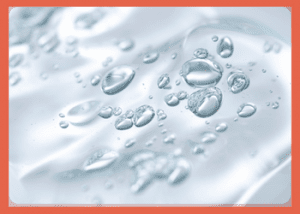Are you searching for the secret to radiant, youthful-looking skin? Look no further than collagen and hyaluronic acid. These two powerful ingredients have been hailed by skincare experts as the key to unlocking a glowing complexion.
Collagen provides structural support to the hair and skin, helping to reduce the appearance of fine lines and wrinkles, while hyaluronic acid acts as a hydrating powerhouse, attracting and retaining moisture to plump and smooth the skin. Together, they make a dynamic duo that can give you the radiant, healthy skin you’ve been dreaming of.
Table of Contents
What are Hyaluronic Acid and Collagen?
Hyaluronic acid and collagen are essential elements for sustaining the health and beauty of your skin. They are vital in preserving a youthful look and lustrous glow.
Hyaluronic Acid
Hyaluronic acid is a naturally occurring polysaccharide that is present in the body, including in the skin.
 It is known for its ability to retain water and hydrate the skin, making it an important component for skin health and appearance.
It is known for its ability to retain water and hydrate the skin, making it an important component for skin health and appearance.
Hyaluronic acid is a powerful yet gentle way to reduce the appearance of fine lines and wrinkles.
It works by magnetically drawing moisture into your skin, hydrating it from within while plumping up its surface.
By continually replenishing your skin’s hydration levels, you can achieve a youthful-looking glow all year round! Not only can it assist in increasing skin elasticity and resilience, but also help keep the skin’s natural protective layer intact.
Collagen
An essential part of our body, collagen is the most plentiful protein and serves as a critical support system for skin health. Utilizing this process helps to keep skin firm, bouncy, and youthful in appearance. It also restores its elasticity for a healthy glow that lasts.
With age, our bodies produce decreasing amounts of collagen – leading to weakened skin health and the emergence of visible signs such as wrinkles, fine lines, and sagging.
Collagen supplements are developed to replenish collagen levels in the body, granting dramatic improvements to your skin health and beauty. This is why countless skincare products utilize them as part of their formulas!
Similarities Between Collagen Serum & Hyaluronic Acid
To augment the vibrancy of your skin and joint health, think about integrating vitamin C into your regular routine. Vitamin C is imperative for generating collagen, which plays a decisive role in safeguarding your skin’s suppleness as well as flexibility in movements.
Good supplementation for joints with a powerful trifecta of nourishment – vitamin C, collagen, and hyaluronic acid.
Get daily doses of the necessary nutrients by taking supplements or applying topical products such as liquid vitamin C serum or creams infused with vitamins. With this potent combination at hand, you can be sure that both your skin and joints are sufficiently supported.
- Both collagen serum and hyaluronic acid are skincare products that are designed to target the signs of aging and improve the overall appearance of the skin.
- They both work to hydrate and plump the skin, reducing the appearance of fine lines and wrinkles, and improving skin elasticity and firmness.
- Collagen serum and hyaluronic acid can be used in combination to provide a synergistic effect, as hyaluronic acid helps to hold onto moisture and keep the skin hydrated, while collagen provides structure and support to the skin.
- Both collagen serum and hyaluronic acid are commonly used topically and are formulated to penetrate the skin and deliver their active ingredients to the deeper layers of the skin for maximum benefits.
Differences Between Collagen Serum and Hyaluronic Acid
There is one key point of distinction between collagen serum and hyaluronic acid: their ingredients. Specifically, high concentrations of collagen protein constitute the makeup of the former, while hyaluronic acid is a naturally-occurring polysaccharide.
Another essential distinction lies in the functioning of these two skincare products. Collagen serum works by providing collagen straight to your skin, thereby aiding to increase levels and boost overall health, while hyaluronic acid functions by drawing moisture into the dermis and replenishing hydration for a beautiful glow.
When comparing their composition, collagen serum is more of a dense and concentrated consistency compared to the lightness and fluidity of hyaluronic acid. Hyaluronic acid glides effortlessly into the skin for easier absorption while still providing immense benefits. On the other hand, collagen’s thicker viscosity enables it to deliver high concentrations of peptides that penetrate deeper into the surface layers of your skin.
Collagen serum is a perfect choice for those aiming to reduce the visibility of fine lines, wrinkles or other signs of aging. Alternatively, hyaluronic acid could be used in case you have dry or dehydrated skin as it can add moisture and revive your complexion.
Additionally, if one notices their skin becoming sensitive to collagen-based products then this would indicate that hyaluronic acid would be more suitable given its compatibility with most types of skin.
It’s worth noting that using a combination of collagen serum and hyaluronic acid can be advantageous when it comes to your skincare routine. Not only do they complement each other, but also provide an all-encompassing range of benefits for the complexion.
Collagen and Hyaluronic Acid Supplements Side Effects
- Although collagen and hyaluronic acid supplements are generally safe, they can trigger certain side effects in certain people.
- To prevent any potential bloating, gas, or stomach discomfort associated with collagen supplement use, it is recommended to start off slow and gradually increase the dosage as necessary. This way you can enjoy the benefits of taking a quality product without experiencing any adverse reactions.
- Hyaluronic acid supplements can cause an allergic reaction in some individuals, particularly those with seafood allergies due to the fact that certain hyaluronic acid supplements are derived from aquatic sources.
- It’s important to remember that some people may experience skin breakouts or irritation when using topical hyaluronic acid products; especially if they have sensitive skin.
- Furthermore, it is fundamental to have a conversation with your healthcare provider prior to incorporating any dietary supplements into your routine — especially if you are expecting, nursing or have an existing medical issue. This precautionary step is crucial since some nutritional additions can interact unfavorably with certain medications and other health considerations.
It is prudent to always consult a healthcare professional before trying any new supplement, especially if you have a history of allergies or skin sensitivities. Taking the time for this step can help prevent adverse reactions and keep you safe in the long run.
Who Should Not Take Hyaluronic Acid?
Individuals with a history of hypersensitivity or allergic reactions to hyaluronic acid or any of its components should avoid its use. Additionally, those with a compromised immune system, such as individuals with autoimmune diseases or undergoing immunosuppressive therapy, should exercise caution when considering hyaluronic acid supplementation or treatments.
Furthermore, individuals with certain medical conditions should consult their healthcare provider before using hyaluronic acid. For instance, individuals with a history of cancer, particularly breast cancer, should approach hyaluronic acid supplementation with caution due to its potential to stimulate cell growth and proliferation. Similarly, individuals with a history of cardiovascular diseases or strokes should seek medical advice before using hyaluronic acid supplements, as it may have implications for cardiovascular health.
Pregnant and breastfeeding individuals should also exercise caution when considering hyaluronic acid supplementation or treatments. While there is limited research on the safety of hyaluronic acid during pregnancy and lactation, it is prudent to err on the side of caution and consult with a healthcare provider before use.
Individuals with a predisposition to keloid scarring or excessive scarring in general should approach hyaluronic acid treatments with caution. While hyaluronic acid is generally considered safe for use in cosmetic procedures and dermal fillers, there is a risk of adverse reactions such as hypertrophic scarring or keloid formation in susceptible individuals.
Moreover, individuals with skin infections or open wounds in the area of application should avoid hyaluronic acid products until the skin has fully healed. Applying hyaluronic acid to compromised skin can potentially exacerbate irritation or lead to infection.
It is essential for individuals considering hyaluronic acid supplementation or treatments to consult with a healthcare professional, particularly if they have underlying medical conditions or concerns about potential side effects. While hyaluronic acid is generally well-tolerated, certain individuals may be at increased risk of adverse reactions or complications, highlighting the importance of personalized medical advice.
Frequently Asked Questions
Can I Use Collagen with Hyaluronic Acid Together?
An ideal combination for vibrant, healthy-looking skin is hyaluronic acid and collagen. Not only are they safe to use together in your skincare routine, but their combined effects offer a dynamic duo of benefits: hyaluronic acid helps lock moisture into the skin while collagen keeps it firm and taut. Get ready to glow!
What Is Collagen Serum?
If you’re looking to reduce the visible signs of aging, Collagen Serum is a perfect option! Packed with high concentrations of collagen – a protein found naturally in our bodies that helps give skin its structure and elasticity- this skincare product penetrates deep into your dermis to improve the appearance of wrinkles, fine lines, and overall texture. Plus it’s easy to use – just apply it topically for maximum results!
Conclusion. Which is Better for Skin Collagen or Hyaluronic Acid?
Ultimately, there is no definitive conclusion as to which of these two skincare components is superior; it’s all personal preference. Nevertheless, we could make the case that collagen serum has a broader scope: not only does it reduce signs of aging but also moisturizes, plumps, and softens your skin.
Although hyaluronic acid is lightweight and non-comedogenic, it can be used alone without extra components. Still, both of these products are beneficial for skin health, but one might become more useful depending on your skincare needs.
For example: if you want to tackle aging and wrinkles – a combo of collagen serum and HA would do the trick; yet if you have a youthful complexion with acne issues – then HA will work great! Either way – both HYA & Collagen Serum offer plenty of benefits that should not be overlooked when planning out your beauty routine.
